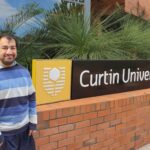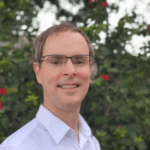Chancellor, Vice-Chancellor, graduates your family and friends and colleagues. Good evening one and all.
Tonight is a wonderful occasion for you the graduates. I remember with fondness the evening I graduated with my undergraduate award. I remember where it was. I remember the graduation ball after the ceremony. I remember being with my proud family. I remember being with friends I studied with for three years, many whom I would not see again for twenty years when we had a reunion of that graduating class.
What I don’t remember is the occasional speaker, let alone what they said. When you are my age and you are recalling this joyous occasion I don’t expect you to remember what I say to you tonight but maybe you might, just might remember my name. So to help you remember this occasional address in the future my name is Simon Forrest. I’ll say it again Simon Forrest and one last time for good measure, Simon Forrest.
I am a Wajuk Nyungar man.
Wajuk Nyungar country stretches from Yanchep in the north to Mandurah in the south and York in the east. My mother can trace her maternal line back to a Nyungar woman who lived in the Swan Valley area in the early days of the swan river colony. The earliest evidence of people living in the Swan Valley is about 38,000 years ago.
The earliest evidence of humans in Australia is about 50,000 years ago at a site in Arnhem Land in the northern territory. These dates represent the oldest continuous knowledge system of any humans on this planet.
Let me put some these dates in context:
- The earliest writing and commerce was in Egypt 3,000 years ago
- The earliest Egyptian pyramid was 4,600 years ago
- The last ice age was 10,000 years ago and the coastline now at Cottesloe and other beachside suburbs was at Wadjemup – Wadjemup is Rottnest Island
- Dogs were domesticated 14,000 years ago
- And 28,000 years ago is the earliest evidence of the Ainu people – the indigenous people of Japan
As a Wajuk man I pay my respects to Wajuk people past and present, to my ancestors who walked this land for at least a thousand generations. I pay my respect also to all graduates, your families and friends here this evening and to my colleagues here with me on this stage.
The graduation this evening marks at one level the completion of something – a degree and the celebration that goes with that completion. We acknowledge the hard work and study done over a number of years and the vital support of family and friends. On another level it is the start of something. Many of you will commence your working career in the area of your specialisation.
This graduation in the main is for degrees in the field of humanities. The humanities cover many areas: education, social work, languages, anthropology, creative arts and so on, but are all to do with the base word ‘human’.
Humanities can be defined as academic disciplines that study the human condition, using methods that are primarily analytical, critical, or speculative and creative, as distinguished from the mainly empirical approaches of the natural sciences.
I heard an engineer say recently in simple terms “engineering is about building and making things to benefit human society.” We only have to look around us: the buildings on this campus, the structure of this stage, the large screens and so on; all would have some type of engineer to help construct these things.
The various fields of humanities are not necessarily about building and making things. The essence of humanities is about people, about humans and the human condition. When interacting with other humans we use different forms of communication to interact such as language, writing of symbols and pictures. But the fundamental nature of humans interacting is about relationships. Engineers may build and make things: social scientists – like you – build and make relationships with people.
When we communicate with other people, especially people we don’t know or have not established a relationship with, we essentially are giving each other ‘trust in credit’.
By trust in credit I mean we have to assume the other person we are communicating with is telling the truth. We trust the other person is telling the truth.
If we all told lies to each other, human societies would just not work. Problems and conflict can arise when people’s truths are different and interpretations of truths are different.
There are different truths by diverse cultural groups about how humans came to be here on this planet. The Aboriginal Australian truth on this matter is based on what is known in the central and western desert of Australia as Tjukurrpa, in the mid-west of Western Australia as Kuduru or in Wajuk Nyungar country as Nyitting. Most Australians know this truth as the dreaming.
From my point of view dreaming is not the best word to describe a very complex system of beliefs, behaviours and laws. Other cultures too have their truth and all equally valid about how humans came to be here.
Australia is the second most culturally diverse nation on the planet after Israel. With this in mind for Australian society to function and be socially cohesive we have no choice but to value and embrace cultural difference. This is about accepting that there are many different truths. Importantly as people who are in the humanities it is how we deal respectfully and civilly with other cultures, their belief systems and their truths.
As human society continues to evolve with engineers making things, advancement in technologies and computers, these all assist us as humans in many ways but it is ultimately up to us how we use these things. This is where people working in the humanities are probably in the most important and exciting fields. No matter what things are invented for us by our fellow human beings it is us who decide how to use them.
The relationships we form with others at an individual level, community level, national and international level are significantly important to how we move on into the future.
I trained as a teacher and taught primary school students in a number of different settings in Western Australia, from remote communities to small rural towns to regional cities. I worked out the important thing about being a teacher – a really effective teacher – is not how well you teach but how well you build relationships. How well you are able to build relationships with the students in your class. Being able to do this, teaching the curriculum content was made easier and was more valuable and I think relevant to the children in my class.
A good teacher knows their students, their background their abilities, their fears, their joys and their capacity to do or not do things. An effective teacher not only knows their students but allows the students to know them – not only as in my case Mr Forrest the teacher but Mr Simon Forrest the person. This builds a relationship of trust. There’s that word trust again. In building a relationship of trust we were essentially following what I stated earlier about communicating with other humans we give trust in credit.
In any work in the humanities we need to develop relationships around trust. It may well be different to individuals and groups how this relationship is initiated and developed but to me it must be done, it is essential in dealing with other humans.
Travelling in Europe a few years ago I remember being at an airport looking at the faces of people in the crowd as they walked past. On our faces we all have two ears, a nose, two eyes and a mouth and hair of different colours and teeth. It continues to amaze me the billions of variations of this small number of features. However, our DNA is virtually the same. We are all descendant from a common ancestor. Our different looks are brought about by the differences in the environment and how humans adapted to those environments.
Historically much has been made of our physical differences for reasons mainly to do with power and authority but biologically speaking we are all basically the same with minor variations.
The only real differences between us as people are about our truths and how we perceive the world around us. So as the second most culturally diverse nation on the planet Australia has a significant role to play in showing the rest of the world how diverse groups of people can live together in harmony. However I think we are in many ways a long way off.
You as workers and future leaders have a major role to play in how Australia progresses as a culturally diverse nation.
I find it really hard to understand how some of my fellow Australians cannot show compassion to other humans who seek sanctuary in this country and an opportunity to share in the good life.
Australia is often described by many as the lucky country – lucky for some maybe – unlucky for others.
My daughter finished year 12 high school last year. The high school she attended had a school motto of just two words ‘for others’.
Much of the schools extra curricula activities revolved around this motto – community work at aged care homes; volunteering at soup kitchens and the like.
We did not send our child to the school based on its motto but the motto is very much in keeping with values that my family endeavour to live by.
‘Treat others as you wish to be treated’
If I was trying to escape political or social persecution or trying to seek a better life for my family I would hope the people I go to would readily help me and show compassion and empathy for my situation and ultimately let me share in the good life.
Graduates, you are the future planners and leaders of the global world in the not so distant future. Your skills and training in working and dealing with people is valuable and will ultimately determine our human global future.
To the graduates, best wishes in your future endeavours and remember two things from this occasional address, my name and:
There is no use an engineer building a bridge if there is nobody willing to cross it.
Thank you.


